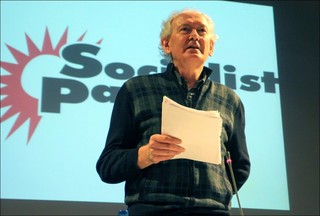
Weston's position was harmful to the workers' cause for the following reason. Suppose a strike forced the bosses to increase their pay from £200 to £250/week. Because production is fixed, the sum total of commodities the new wage would be able to buy could only be the same as the old. If wages go up, the capitalists have to increase prices too. In other words, an inflationary price spiral would occur negating any wage gain. The struggle for better pay was pointless so workers might as well forget about taking their bosses on. You can see now why Marx was so keen to counter Weston.
Facts are real world developments in wages and prices had refuted Weston's argument even before they were uttered by his lips. In the 1849-59 period the wages of agricultural and factory workers rose 40 per cent. If Weston was right, prices should have galloped upwards by the same amount. But in fact the wheat produced by these better renumerated farm workers fell by 16 per cent! What's going on? In this case labour productivity increased alongside a rising demand for wheat to feed the growing urban population. Supply not only successfully met demand, but managed to outstrip it. You cannot then argue, as the establishment often does, that wages determine prices. So what does?
When you look at the immense collection of commodities that constitute the market, it appears their values are relative to one another. For example, my diary cost £4 and my much-coveted man bag, £12. The value of the latter could be expressed by three of the former, but what determines the ratio? For Marx, commodities in their essence can all be reduced to a third party, and that is (abstract) labour. Commodity values differ, as Marx puts it, "only by representing greater or smaller quantities of labour ... for example, a greater amount of labour may be worked up in a silken handkerchief than a brick" (p.34). Labour, or rather as Marx and Marxists later called labour power, is measured by time. Therefore a commodity's value is determined by the amount of labour power necessary for its production, not by wages.
The labour time necessary for production (socially necessary labour) is a certain average of the conditions of production pertaining at any given time and increases/reduces according to the course of historical development. As competition between capitals compels employers to constantly revolutionise the forces of production, more quantities of commodities can be produced in less and/or the same time. The extent of the labour socially necessary is reduced and the values of commodities fall. But if anything impinges upon the productivity of labour, such as weather events or resource shortages, the volume of necessary labour increases pushing up value.
Now this is where it gets a bit tricky. Value is not the same price. Historical development has seen precious metals, then coin, then paper money stand as the representative of abstract labour. The more valuable a commodity, i.e. the more abstract labour bound up in it, the higher the price. Where price perfectly expresses value, we have 'natural price'. But commodities tend to trade at their 'market price', which Marx defines as "the average amount of social labour necessary, under the average conditions of production, to supply the market with a certain mass of a certain article" (p.40). If you like natural price is the element market prices for commodities fluctuate around. If supply and demand are in balance there is a tendency to sell at natural price. If there isn't, if supply outstrips demand or demand cannot be met the market price will swing above and below this level.
Where does profit come into it? As commodities are sold at their value (modified bby market price), profit does not come from selling at above their value. If this was the case then a scenario similar to Weston's would result. As everyone would be forced to do the same, what the seller gains they lose as a buyer. Profit therefore is interior to the system of commodity exchange, but how? A worker agrees to sell their ability to labour to an employer for a given period of time in return for a wage. For argument's sake, let that stand at £250 for a 39 hour week. This wages stands for the money a worker needs to reproduce themselves as a worker physically and culturally. Once in work, suppose it takes them 10 hours to produce £250 worth of commodities. This is paid to them as wages. Yet there's still 29 hours of the week to go! From this standpoint, this remainder is 'surplus labour', and the value they generate accrues to their employer as surplus value. But it immediately appears that this is not the case. Because the wage for 39 hours is £250, common sense suggests £250 is the value of 39 hours. Surplus extraction, therefore, is hidden by the wage relation. Where commodities are concerned then, they may be concentrations of abstract labour, but part is paid, and part of it is unpaid surplus labour. When they are sold at their value it still reflects all the labour embodied in them, realising surplus value.
This surplus value is not identical to profit. Once it has been realised, part of it is paid out on rental and mortgage payments, part as interest payments on loans from the banks, and part on any other obligations the owner may have. What is left is profit, which can be disposed of as they wish. We can therefore work out the rate of profit as a ratio between the capital that was originally thrown into the production process and the profit it realises. Therefore if wages are increased, the rate of profit falls, but this does not necessarily mean a rise in commodity prices. That decision is solely the province of the bosses. But if profit is to be increased, the reverse is true. More surplus value is demanded, which can either be done via new production technologies and/or increasing the quantity of unpaid labour done by lengthening the working day at little or no extra wages. As Marx says:
A man who has no free time to dispose of, whose whole lifetime, apart from the mere physical interruptions by sleep, meals, and so forth, is absorbed by his labour for the capitalist, is less than a beast of burden. He is a mere machine for producing Foreign Wealth, broken in body and brutalized in mind. Yet the whole history of modern industry shows that capital, if not checked, will recklessly and ruthlessly work to cast down the whole working class to this utmost state of degradation. (p.67-8)This scenario has not come to pass only because of working class political action down the ages. There is a historical tendency for capital to push workers to their limits, which are the (historically and geographically variable) absolute minimum standard of living. While the bosses coin it workers are compelled to fight to retain their present conditions. But as Marx concludes, "quite apart form the general servitude involved in the wages system, the working class ought not to exaggerate to themselves the ultimate working of these everyday struggles. They ought not to forget that they are fighting with effects, but not with the causes of those effects; that they are retarding the downward movement, but not changing its direction; that they are applying palliatives, not curing the malady. They ought, therefore, not to be exclusively absorbed in these unavoidable guerilla fights incessantly springing up from the never ceasing encroachments of capital or changes of the market. They ought to understand that, with all the miseries it imposes upon them, the present system simultaneously engenders the material conditions and the social forms necessary for an economical reconstruction of society. Instead of the conservative motto, "A fair day's wage for a fair day's work!" they ought to inscribe on their banner the revolutionary watchword, "Abolition of the wages system!""







